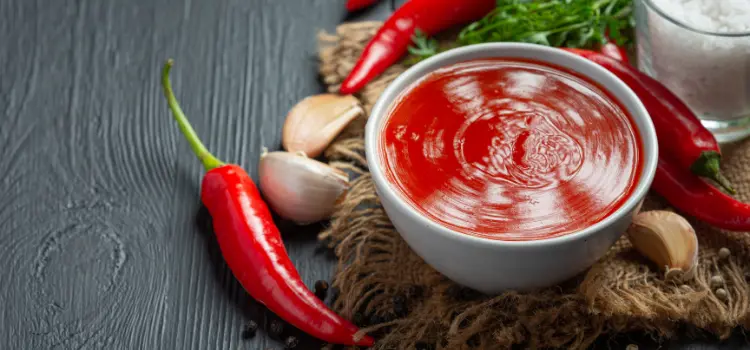As an Amazon Associate I earn from qualifying purchases.
Japanese BBQ sauce, with its rich umami and sweet-savory profile, has become a staple in kitchens worldwide. From its intriguing history to its diverse applications in various dishes, understanding how to use Japanese BBQ sauce can elevate your culinary experience. So, let’s dive into the flavors, techniques, and cultural significance of this delectable condiment.

Introduction
When it comes to elevating your culinary experience, Japanese BBQ sauce stands out as a flavorful masterpiece. In this guide, we, as culinary enthusiasts, will delve into the exquisite world of Japanese BBQ sauce and unveil the secrets to using it like a seasoned chef.
Japanese BBQ sauce, often referred to as “tare,” is a versatile and umami-packed condiment that traces its origins to the vibrant Japanese culinary tradition. Unlike conventional barbecue sauces, Japanese BBQ sauce combines the perfect balance of sweetness, saltiness, and savory umami notes, creating a symphony of flavors that dance on your taste buds.
History of Japanese BBQ Sauce
Japanese BBQ sauce, also known as “tare,” has a fascinating history rooted in traditional Japanese culinary practices. Dating back centuries, it originated as a simple mixture of soy sauce, sake, and mirin, evolving to incorporate diverse ingredients like garlic, ginger, and sesame. The distinctiveness of each regional variation adds to the allure of Japanese BBQ_sauce.
Types of Japanese BBQ Sauces
Teriyaki Sauce
Teriyaki sauce, a popular variant, blends soy sauce, mirin, and sugar for a sweet glaze. Ideal for grilling chicken and fish, its caramelized finish imparts a delightful flavor.
Yakiniku Sauce
Yakiniku sauce, designed for grilled meat, boasts a savory blend of soy sauce, sake, mirin, and garlic. Its bold taste complements beef, pork, and even vegetables.
Tare Sauce
Tare sauce serves as a versatile base, with variations across regions. Combining soy sauce, sake, mirin, and sugar, it forms the foundation for many Japanese_BBQ dishes.
Making Your Japanese BBQ Sauce at Home
Crafting your Japanese BBQ_sauce allows for customization to suit your taste preferences. Gather soy sauce, mirin, sake, sugar, garlic, and ginger. Simmer and stir until a glossy consistency is achieved, providing the perfect balance of sweetness and umami.
Choosing the Right Japanese BBQ Sauce for Your Dish
Pairing Japanese BBQ_sauce with a suitable dish enhances the overall dining experience. For chicken, opt for teriyaki; yakiniku sauce elevates beef, while tare sauce offers a versatile option for various proteins and vegetables.
Making Your Japanese BBQ Sauce
Crafting a Homemade Masterpiece
While store-bought options are readily available, creating your Japanese BBQ_sauce allows you to tailor the flavors to your liking. Experiment with ingredient proportions and additional flavor enhancers to achieve a personalized sauce that reflects your culinary preferences.
Popular Dishes Using Japanese BBQ Sauce
Yakitori
Yakitori, skewered and grilled chicken glazed with teriyaki sauce, is a beloved street food in Japan. Recreate this flavorful dish at home for an authentic culinary adventure.
Teriyaki Chicken
Teriyaki chicken, a global favorite, features grilled chicken coated in teriyaki sauce. Serve it with rice and vegetables for a wholesome meal.
Yakiniku Beef
Yakiniku beef, marinated in yakiniku sauce, showcases the rich, savory notes of Japanese_BBQ flavors—grill to perfection for a succulent and aromatic experience.
Tips for Grilling with Japanese BBQ Sauce
Marinate meats for at least 30 minutes before grilling to allow the flavors to penetrate. Adjust grilling temperatures based on the thickness of the meat, ensuring a juicy and charred result.
Health Benefits of Japanese BBQ Sauce
While indulging in the flavors of Japanese BBQ_sauce, appreciate its nutritional components. The sauce contains essential amino acids, contributing to a balanced diet when consumed in moderation.
Japanese BBQ Sauce in Fusion Cuisine

The versatility of Japanese BBQ_sauce extends beyond traditional dishes. Explore fusion recipes, combining Japanese flavors with other culinary traditions for a delightful cross-cultural culinary experience.
Common Mistakes to Avoid When Using Japanese BBQ_Sauce
Avoid over-marination, which can overpower the natural flavors of the dish. Additionally, ensure proper pairing to prevent clashes that may compromise the intended taste.
Consumer Favorites and Reviews
Survey results and testimonials highlight the popularity of Japanese BBQ_sauce among consumers. Explore different brands and discover the one that resonates with your taste buds.
DIY Japanese BBQ_Sauce Gift Ideas
Surprise friends and family with personalized Japanese BBQ_sauce gifts. Package your homemade sauce in stylish containers, accompanied by recipe cards, for a thoughtful and unique present.
Culinary Trends: Japanese BBQ_Sauce and Social Media
Stay updated on viral Japanese BBQ_sauce recipes circulating on social media. Influencers often share innovative ways to incorporate this condiment, inspiring you to experiment with new culinary creations.
FAQs about Japanese BBQ Sauce
Yes, many Japanese BBQ sauces have vegetarian variants, using plant-based ingredients.
Absolutely! Teriyaki sauce, in particular, complements the flavors of grilled fish.
Store it in an airtight container in the refrigerator for up to two weeks.
Teriyaki sauce is sweet and ideal for chicken and fish, while yakiniku sauce has a savory profile, perfect for beef and pork.
Yes, Japanese BBQ_sauce doubles as a flavorful dipping sauce for grilled meats and vegetables.
Conclusion
In conclusion, mastering the art of using Japanese BBQ_sauce opens up a world of culinary possibilities. Whether you’re grilling meats, experimenting with fusion recipes, or gifting personalized creations, the versatility of this condiment knows no bounds. Embrace the flavors, get creative in the kitchen, and elevate your dining experience with the enchanting taste of Japanese BBQ_sauce. Elevate your dishes, embrace the umami, and let the flavors of Japan enchant your taste buds.
As an Amazon Associate I earn from qualifying purchases.








